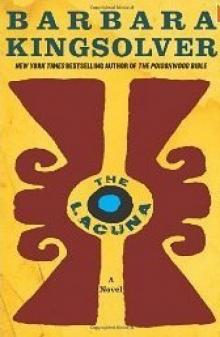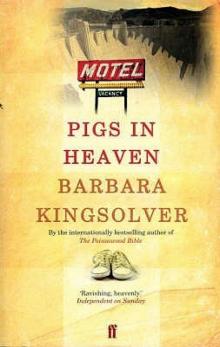- Home
- Barbara Kingsolver
The Lacuna Page 20
The Lacuna Read online
Page 20
"What program is that?"
"Cortes and the Azteca. Writing a true history of Mexico. I think you're right, you should crack open the mute culture, give those boring heroes some sweat and piss."
"Do you think?"
"Look, there's no sense pretending history is a goddamn Homeric Odyssey."
A brilliant red bird landed overhead, the same color as the coral-bean blossoms, resting briefly on the swaying branch before it flew away. Frida packed up the last of the meal. "It's good we talked today. We don't have a lot of time."
"What do you mean?"
"I have to get ready for a show. I'm having a real show, my own paintings entirely. Can you imagine?"
"That's wonderful."
"Soli, it's terrifying. It feels like I've been lying in the bathtub all this time admiring my own curly pendejos. And now a hundred people are looking in through the curtain, applauding."
"Oh. When is the show?"
"When is not the question. Where is the question. New York. I'm going at the end of summer. The show opens in October, and after that I'm going to do another one in Paris. It was Mr. Lion-Maned Poet who set up the show in Paris, to tell you the truth. Andre. I should try to be nicer to him. Anyway." She seemed out of breath.
"Are you all right?"
"A little afraid, I guess. I'm leaving Diego for a long time. Leaving everybody, but in a different sense, leaving Diego."
"I don't believe that. You and that frog can't breathe without each other."
"Well, we'll see. Anyway, I wanted to repair some damages, before I go."
She lay back and closed her eyes. After a minute she asked, "How do you know it was my birthday, the day we met in the Melchor market?"
"Because it was mine too."
She sat up and her eyes opened wide, like a doll. "We have the same birthday?"
"Yes."
"All this time?"
"Every year, in fact."
She stared, recalculating history. "All those parties and birthday fiestas. You've been working like a slave on your own cumpleanos."
So after all, she cannot divine everything.
She lay back again and closed her eyes. "Mi vida, don't keep secrets from me. You shouldn't even try, you see how we're connected? It will always be the case. We came into life through the same passage."
With damages repaired to her satisfaction, she fell asleep almost immediately, leaving one strange landscape for another, her dreams. Soon she would leave this place altogether--Diego, Mexico, the house and everyone in it.
The bones of the ancient city radiated heat, but the little river ran a cool thread through its belly. A lizard moved in the grass of the bank, running into the shade of a ledge, coming to rest near a stone that seemed rounded and glossy, even in shadow. That stone was smooth to the touch, and when turned over, revealed itself not as an ordinary pebble but a small, carved figurine. A little man made of jade or obsidian, something ancient, small enough to hide inside a closed hand. A remarkable artifact. It should be turned over to the professor. Obviously it would be wrong to take it from this place.
Every detail of the little figure was perfect: his rounded belly with indented navel, his short legs and fierce face. A headdress that resembled a neat pile of biscuits. Eyes deeply indented under arched brows. And inside his rounded lips, a hole for a mouth, like a tunnel from another time, speaking. I am looking for the door to another world. I've waited thousands of years. Take me.
The New York Times, April 15, 1939
Rivera Still Admires Trotsky; Regrets Their Views Clashed
Artist Explains He Quit Fourth International So as Not to Embarrass Leader--Reveals Letter Caused Their Rift
By Diego Rivera
MEXICO CITY, April 14--The incident between Trotsky and myself is not a quarrel. It is a lamentable misunderstanding which, going too far, brought about the irreparable. That compelled me to break my relations with a great man for whom I always had, and I continue having, the greatest admiration and respect. I am very far from harboring the silly presumption of engaging in a polemic with Trotsky, whom I consider the center and the visible head of the revolutionary movement that is the Fourth International.
The Mexican proverb says, "He who does not block the way helps a lot." In the future, my personal actions and opinions, should I have any, will block neither Trotsky's nor the Fourth International's path.
The incident between Trotsky and myself had its origin in a letter addressed by me to my friend, the French Poet Andre Breton. That letter was typed in French for me by one of Trotsky's secretaries. Trotsky happened to see a copy that had been left on the secretary's desk, according to the written declaration that he sent me, and the concepts I expressed in my letter, in reference to the general situation of the Leftist forces in the world, to the social role of artists and to their position and rights within the revolutionary movement, besides some personal allusions to him, so displeased Trotsky that he expressed opinions against me which I found unacceptable and which compelled me to split with him.
Trotsky toils without respite, helping continually with his mental effort the slow and difficult work in preparation for the liberation of the workers of the entire world. About him he has a general staff of young secretaries, volunteers come from the four corners of the earth, to help in this work. Meanwhile, other voluntary workers watch day and night over the safety of the man who, together with Lenin, gave its victory to the proletariat of Russia. These and all the other thousands of heroes of October now, from the exile imposed upon them by Stalin's counter-revolution, continue to labor for the future victory of the workers of the entire world.
The enemies, the "organizers of defeat," Stalin and his GPU, persecute the man of October. Everywhere they have tried to hurt him, to annihilate him psychologically through the extermination of his family.... Meanwhile his closest collaborators, persecuted and threatened, are murdered, one after another. It is natural that this state of things and the accumulation of sufferings it produces have had their effect upon the man of October, despite his enormous will power and self-assurance. It is natural that Trotsky's disposition should have become more and more difficult, despite his huge reserve of goodness and generosity.
I regret that fate should have decreed that I should collide against that difficult side of his nature. But my dignity as a man precluded my doing anything to avoid it.
Casa Trotsky, 1939-1940 (VB)
On the morning Lev and Natalya moved out of the Blue House, an egret came down from the sky, its broad white wings spread like a parachute, and landed in the courtyard. It extended the S-curve of its long neck until nearly as tall as a man, turning its long-beaked head this way and that, peering at each person present. Then it strode across the bricks to the front gate, lifting its long legs at the knee like a man riding a bicycle. The chief guard shoved the gate open, just a crack, and four men with pistols in their belts stood watching an egret cross Allende Street, disappearing around the corner.
Frida would have claimed it as an omen on Lev's departure. But she is not here, she's in Paris where everyone is an idiot, according to her reports. Natalya, unprepared to trust in signs, was swaddled in the same woolen suit and hat she wore the day they arrived on the ship from Norway. Lev was less armored, in a white shirt open at the collar. Each carried one small suitcase. Van, who has been inattentive since falling in love again (this time she's American), kept his eyes down and stayed busy moving crates of papers into the car sent by Diego. Diego himself was not present.
Every person may have felt some accusation in the heron's glare, for which member of the household was blameless? Frida went away, leaving Diego and Lev with only their needles of irritability to fill a space evacuated of desire. And Diego, poor man, can only be the person he is. An organizer who can't get to meetings on time, a secretary who forgets to answer letters. He has the heart of an anarchist, not a party functionary.
Some blame of course goes to Stalin: his threats hanging over th
is house, the murders of Trotsky's children, peers, and collaborators, the annihilation of his whole generation in Russia. Stalin's cruelties have pressed the souls of this household flat as ancient skeletons in the dust.
But most to be blamed: the careless secretary who unraveled everything.
Diego wrote the newspapers about his split from Trotsky, reporting his desire to stand out of the way of a great man. "An accumulation of sufferings have had their effect," he wrote, without naming them all: the affair with Frida, for example, though that's said to be forgiven. The note he dashed off to Breton complained, "The bearded old goat is serious every minute. For God's sake, can't he let the Revolution rest for a night and get drunk with a friend who risked everything? Who's housed and fed his entourage for two damn years? How can any mortal tolerate these overcast Russian temperaments?"
He scribbled the note in Lev's own office and gave it over to be typed, a hasty act of bravado, while Lev was elsewhere. The letter should have been posted to France immediately. Instead, the preoccupied secretary, in his haste to get the evening's cooking started, left it lying on the Ediphone table, where Lev later found it. The old man came in the kitchen later with his glasses off, rubbing his eyes, too tired, he said, for supper. Just a piece of toast, perhaps. Bed early, plans to make tomorrow.
What a knot of history one mistake can become. Trotsky was meant to succeed Lenin as president of the Soviet, but a small accident caused the job to fall to Stalin instead. Diego never told what the accident was. Only that small caprices alter fate. One letter, left out by accident. If Diego and Lev had kept their alliance, they might have forged a movement to overthrow Stalin. The peasant armies of Mexico worship Diego, but they need Lev's strategic intelligence. From Michoacan, blazing through the brigades of Spain into all of Europe, the world might yet take up Lev's dream of socialist democracy. But a careless mistake has torn this league asunder.
Why did Diego call his friend a goat? He expected the word to vanish with the afternoon post, that's why. Bitter words normally evaporate with the moisture of breath, after a quarrel. In order to become permanent, they require transcribers, reporters, complicit black hearts. Diego meant nothing by that letter; his respect for Lev is undying. He had an eye infection that week, a cramp in his stomach after a lunch of too many pork sandwiches. From somewhere in that roil, a few poisonous sentences erupted. Now the world has them.
And the secretary? Was his sin sloth, or pride? The letter was in French, but why couldn't he have asked for Van's help to change the words, and type a tactful version? And why didn't he post it at once, as requested? A remembrance of last year's jacaranda in the window, the sound of something breaking in the kitchen--for no good reason he forgot, and left the letter on the table.
The mistake has left him panting like the victim in a crash: his loyalty to Lev bent like pieces of metal around his chest. The wrecked engine of Rivera spewing petrol, threatening flames. He must extricate himself by making a choice. Diego says stay, as typist-cook and errand boy, for the same coins that have rained down steadily since the first bewildered day of mixing plaster on the floor of the Palacio Nacional. But Lev also asks for continued service. He needs a trusted secretary more than ever, because of the perilous relocation, and Van's increasing distractions. Lev offers a room and cot in a house of clear, bright dreams, which could all be murdered tomorrow. The Painter offers money, asking only to be worshipped.
At seven this morning, after a brief rainstorm, Lev Trotsky lifted his suitcase, stepped across the puddles in the brick walk, and left the Blue House for the last time. He and his wife climbed into the back of the car with Lorenzo the guard, his rifle lying across their knees, and Van in the front passenger's seat, also armed. The driver sat very straight, as if his body were pierced like a Hindu's with a thousand nails of guilt.
"We are ready, my son. Drive," Lev said, and together the small party traveled six blocks to a wrecked, vacant house on Calle Viena, rented from a family called Turati, where they will make their new home.
If any brokenhearted man ever made a better show of good cheer, it could only have been in the moving pictures. Lev's efforts to make the best of the new arrangement have buoyed everyone. Natalya has put away Phanodorm and taken up housecleaning: sweeping cobwebs from the high, pale green ceilings of this Porfirian mansion, washing its leaded-glass windows and arranging furniture. Sometimes she ties on an apron and makes Lev's breakfast. Today she painted chair rails and all the wooden cabinets in the dining room, a nice combination of yellow and brown that Frida would have called boring. What a relief, that she is no longer reading these pages.
The Americans, Joe and Reba Hansen, have come here from the apartment where they had retreated from Rivera hospitality and Rivera complications. A new couple has arrived also, Mr. O'Rourke and his off-beat girl friend Miss Reed. Everyone seems relieved to gather over simple suppers in the main room here, with an old yellow-checked tablecloth on the long table and no one worrying about wine spills. Debating the day's news instead, under no secret storm clouds of household intrigue. Van plays music programs on the wireless and whistles along while typing, when no one else is in the office. His happiness, as always, seems to be linked to a girl.
Only Lorenzo is cheerless, but that's nothing new. He frets, whether on or off duty, a worried monument pulling on his huge black moustache, his face burned to red leather from the hours spent staring out at the menacing world. His forehead, a startling white above the line made by his hat, when he removes it for supper. Protecting Lev has been a terrifying charge since the day they walked off the planks at Tampico. Lorenzo has apprehended dozens of threats, not only the barefoot vigilantes but also the cool plots of Mexican Stalinists. Lately Toledano has been going to unionists' meetings, offering cash to any man willing to put a bullet in Trotsky. Most men these days need the money.
Everything is reported to Lev but not Natalya. She only learns the worst of it when the police are forced to arrest someone and the story makes the newspapers, wedged between the usual confabulations about the "Russian Traitor in Our Midst." Lorenzo and the three young guards take six-hour shifts on the roof, around the clock, walking the perimeter on the brick parapet. The black rock wall around the courtyard was three meters tall to begin with, but the masons have raised it higher still, with brick turrets and notches for rifle bores. It will be good if Lev can purchase the house, because of the need for these alterations. Joe Hansen says money is coming from the Trotskyist party in the United States. The Socialist Workers.
The kitchen here is very adequate: a gas stove with four eyes, a plank counter and icebox. And within the high walls, the courtyard offers a bright relief of trees, shaped as a triangle between the main house and the long, narrow brick guard house running opposite at an angle. Here at last, guards and secretaries may have some privacy, the guard house has four rooms in a row downstairs and four above. The garden is shaded by an old jacaranda and some figs. Lev wants to retrieve the cactus specimens he collected in San Miguel Regla, which stand potted in some forsaken corner at the Blue House, so he can make a cactus garden. Today after lunch he pointed out where he intends to plant each one, with stone paths for roaming between the bits of garden, a park in miniature. It's an impossibly small space for such an elaborate plan. But this tiny plot, measured in meters, is Lev's last remaining homeland.
It seems an airy enough estate, from inside. The strange spectre of confinement becomes striking only from the outside, when one walks home to it from the market, for example. The compound occupies a flat-iron shaped lot in Coyoacan where Calle Viena and Rio Churubusco meet at an angle. The high, dark walls enclosing it come together at a point, looking exactly like the dark prow of an ocean liner: the great, slow ship of Trotsky's fate setting sail down Churubusco, as if it were still a canal in the city on a lake, as Cortes found it. As if one could still build a ship in the desert, and set one's sights on a new world.
Lorenzo's mother came this week from the country, bringing one m
ore pair of eager eyes for guard duty: her daughter's boy, Alejandro. Also, two pairs of rabbits and some checkered hens. Lev is as happy as a lad with his new livestock. The rabbits now have hutches near the entry gate, but Lev says the chickens are "emancipated travelers," free to roam the courtyard. Natalya objected on grounds of sanitation, and the hens' safety.
"Nataloschka," her husband said, "no wolves live here. The chickens are the only ones without the worry of a predator. Let them have an open visa." Of course she conceded. In Lev's new study, he sets his chair so he can see out the window into the courtyard where they scuttle around, cocking their heads at beetles in the dust.
Perpetua has walked down the street from the Blue House twice this week, to deliver some pottery Natalya liked especially. Her favorite is the white glazed platter with fish leaping over it, a gift from Frida when they first arrived. Natalya thanked Perpetua and put it away in a cabinet, but today she has brought it out and set it against the wall. In the years with Lev her world has been so constrained, with so few objects of beauty in it. She is not a bulldog, only a woman pressed into the shape of a small jar, possibly attempting to dance in there. It shows in the way she places a seashell on a window sill, a red-painted chair in the corner: she is practiced in the art of creating a still life and taking up residence inside it.
Lorenzo's nephew, Alejandro, is the youngest of the guards, nineteen or twenty perhaps. From a tiny village near Puebla, he's the only one of the guards who is not from the political movement, but Lorenzo guarantees his loyalty. Lev welcomes a new recruit.
Alejandro seems happy just to escape a certain village misery. He has a shy, odd manner, precisely what Frida would call a queer duck. She would say she approved, then make sure everyone watched him like a fish in a bowl. Probably she can't help that, she's been watched that way herself since marrying Diego.
In New York and Paris when she flew high, the newspaper stories tried to shoot her down. Now that she is coming home, apparently washed up, what they say about her is worse. Like Natalya, she must feel the need to retreat into a small space, making still-life creations and painting herself inside. She doesn't have to hide from assassins, but being Much-Discussed appears to be its own kind of prison.

 Prodigal Summer: A Novel
Prodigal Summer: A Novel Animal Dreams: A Novel
Animal Dreams: A Novel The Poisonwood Bible
The Poisonwood Bible High Tide in Tucson
High Tide in Tucson The Lacuna
The Lacuna The Bean Trees
The Bean Trees Animal, Vegetable, Miracle: A Year of Food Life
Animal, Vegetable, Miracle: A Year of Food Life Pigs in Heaven
Pigs in Heaven Small Wonder
Small Wonder Flight Behavior
Flight Behavior Homeland and Other Stories
Homeland and Other Stories How to Fly (In Ten Thousand Easy Lessons)
How to Fly (In Ten Thousand Easy Lessons) Unsheltered
Unsheltered Animal Dreams
Animal Dreams Prodigal Summer
Prodigal Summer Animal, Vegetable, Miracle
Animal, Vegetable, Miracle